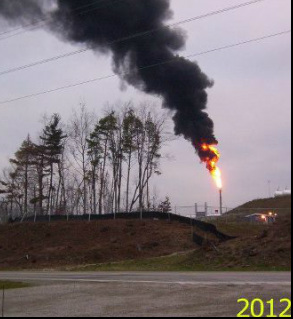
Fort Collins, Colorado is a case study on the subjects of denial, destruction, and deception. On February 11th and 12th 84,000 gallons of green oil-laden fracking fluid [video] gushed from an oil well near Fort Collins for nearly 30 hours before it was stopped. According to Denver’s NBC affiliate 9NEWS “A hydraulic failure…caused a piece of equipment to fall onto a valve and break it at the drilling site.” The site was being operated by PDC Energy. Nick McGurk, the NBC reporter that covered the story, uses industry friendly terms when describing the blowout. He calls toxic waste water “flowback water” and defines it as “mostly water but some oil” ignoring the other toxins and carcinogens. He never called the incident a blow-out. He instead refers to it as a “release.”
Bart Brookman, senior vice president of operations for PDC Energy said, “Trying to associate this incident with fracking is not fair.” He instead blamed a “mechanical problem with the work-over rig.” Todd Hartman, spokesman for the Colorado Oil and Gas Conservation Commission (COGCC) contradicts his agency’s own report and insists that the incident “was not a blowout.”
Not surprisingly, the most crafted and misleading statement came from PDC itself. When asked about the company’s track record regarding previous spills, a spokesman from PDC downplayed concerns, saying that nothing like this had ever happened in Weld County before. He obviously chose his words very carefully because the full truth paints the picture of a company with a dismal record on safety. A study of state records done by The Fort Collins Coloradoan show that PDC Energy has been involved 34 other oil and gas-related spills and incidents in 2012-2013 in Colorado—15 of which contaminated groundwater. This type of deceit appears to be commonplace when oil and gas companies are dealing with the public.
A perfect example is Rex Energy’s August 15, 2011 conditional use hearing in Lancaster Twp., Butler County. During the hearing, several people raised concerns about the safety of fracking and contingency plans regarding accidents and waste water hauling. Melissa Hamsher, Rex Energy’s vice president of environmental, health, safety and regulatory compliance told a standing-room only crowd that Rex had received no complaints regarding the wells in Lancaster Township. She neglected to inform the public about recent and, at that time, widely unknown complaints of water contamination in Connoquenessing Twp. even though she was well aware the problems. She was quoted in a news story about the contamination on WTAE that ran on August 10, 2012. For some reason the story and video have been removed from the WTAE site.
Back in Fort Collins, the PDC Energy blowout couldn’t have come at a worse time for the oil and gas industry. The City Council was moving forward on a proposed ban on fracking. Things were heating up. Ignoring the public’s fear of what fracking was doing to their community, Colorado’s Gov. John Hickenlooper’s had threatened to sue any municipality that passes such a measure. On Feb. 19th the Colorado Oil and Gas Association (COGA) presented a petition to the Fort Collin’s City Council with what they said were signatures of residents and business owners who oppose the proposed ban. As it turns out, many of the signatures on the petition were fakes. Once the deception was revealed, COGA attempted to remove the petition from the public record. “COGA has ascertained we made mistakes in the collection of signatures on a petition submitted to City Council last week opposing a ban on hydraulic fracturing,” COGA President and CEO wrote in an email to the council. “As a result, we withdraw that petition from the record.” But Fort Collins city officials will not remove it from the public record; said Rita Harris, deputy Fort Collins city clerk, “We’re not giving it back."
On March 5th the Fort Collins City Council voted 5-2 to ban fracking within the city. Now that the people have spoken, Gov. Hickenlooper appears to be softening on his original stance and is talking about a compromise with communities that ban fracking.
We applaud the bravery of both the Fort Collins City Council, as well as the New York State Assembly who this month passed a two year fracking moratorium. Why have the regulatory agencies and politicians of Pennsylvania been reluctant to stand up to the powerful oil and gas lobby?
A possible answer comes from a new report from the Public Accountability Initiative. In it they point to a revolving door between the industry and the agencies charged with overseeing it. They conclude that “[t]he prospect of lucrative industry employment for regulatory and political insiders has a corrupting effect on this process, to the point where the line between government and industry blurs and the public bodies that are supposed to regulate industry instead become captured by it.” The report identifies 45 current or former public officials in Pennsylvania with ties to the energy industry as well as to the regulation of fracking. Remember Rex Energy’s Melissa Hamsher who make misleading statement to the public in Lancaster in 2011? As late as 2007, she worked for the Pennsylvania Department of Environmental Protection (DEP).
More troubling is the appointment by PA Governor Corbett of Michael Krancer as Secretary of the Department of Environmental Protection (DEP). Mr. Krancer had once been Assistant General Counsel of Exelon Corporation, an American energy producer, trader, and distributor, and emphasizes a business-first philosophy of environmental regulation. He told the PA Senate Environmental Resources and Energy Committee that “Responsible, strong, vibrant and growing business is necessary as an engine for the protection of the environment.”
Three of PA’s former governors have financial and/or professional ties with the drilling industry. Tom Ridge's lobbying firms garnered a $900,000 contract from the Marcellus Shale Coalition. Mark Schweiker, joined a lobbying firm with a Marcellus Shale practice. Ed Rendell is a partner in a private equity firm that both invests in and lobbies for a drilling company.
The current PA Governor Tom Corbett and his wife took over $15,000 in gifts from law firm representing the oil and gas industry. He also accepted $1.8 million in campaign donations from oil and gas interests. PA’s Rep. Mike Kelly and his wife owned shares in two privately held natural gas companies that owned gas leases on 317,000 acres when he was elected in 2010. In June 2011, the couple made between $10.1 million and $50.2 million when Exxon Mobil bought the companies. Rep. Kelly continues to rail against the EPA for efforts to regulate the industry and for investigating concerns about water contamination in relation to fracking.
In recent weeks, we have been inundated with the news of a steady flow of explosions, spills, accidents, and illegal dumpings that threaten the health of our families, our communities, and our outdoor heritage. Only by educating the public and creating a movement will we be able to wash away the destructiveness dike of this rogue industry and carve out our own course.
-MOB

 RSS Feed
RSS Feed
